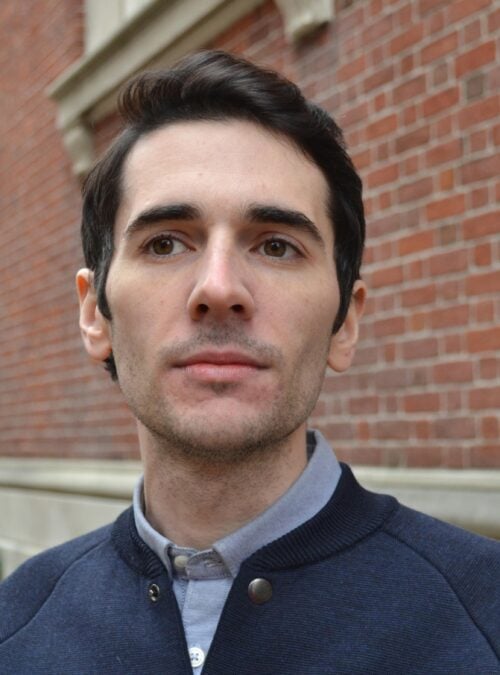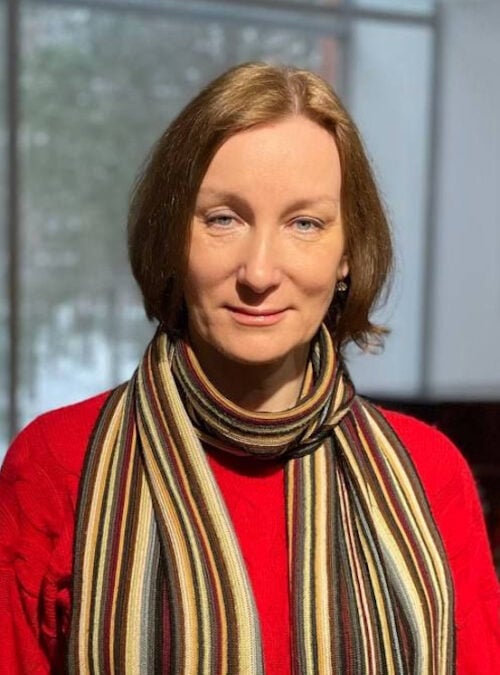“What do translators do when they are not translating?”
Author: Paolo Grossi

After graduating in Italian Studies at Stendhal-Grenoble III University and then obtaining a Master’s in Publishing from Paris XIII University, Lise Caillat spent the next ten years working as an editor and bookseller, but also translating literary texts. Since 2017, she has been working full-time as a translator, forever on the look out for Italian authors and books she thinks French readers would like to discover. She frequently runs translation workshops aimed at helping readers and anyone who loves words to better understand the joys and challenges of her profession.
Lise Caillat, first of all, would you like to tell us how you came to be a translator?
I grew up in Grenoble, in an environment and family of italophiles, so I developed an interest in the language and culture of Italy at an early age. While at university, where I studied Italian and French literature, and started learning the art of translation, I realised that this profession, truly amazing, but also mysterious, could allow me to engage in my two great loves: books and Italy. It was a revelation. At the time, I didn’t even know how you entered the profession – I wasn’t even sure there was such a profession. But I managed to achieve my dream by first working in the publishing field. While I was working on the dissertation for my Master’s on publishing exchanges between France and Italy, I had an internship at Gallimard, where I started working as a reader for the foreign literature series “Du monde entier”. For my own pleasure, I began translating what I thought were the most important pages of the books I was reading. Then, in 2006, Gallimard gave me my first translation job: Giulia Fazzi’s debut novel, Ferita di guerra. It was an amazing opportunity and an amazing experience, which I will never forget. And that is how this adventure began.
Let’s now turn to the question in the title of this interview: when you’re not working on translations, exactly how many and what other tasks are there in addition to translating?
Well, for economic reasons, to begin with – and for quite some time –, I also had to do another job, as my primary or secondary activity. I worked first as an editor and then as a bookseller, translating in my spare time.
Nowadays, when I’m not translating, I read. Frenetically, incessantly. I read books that have just come out or are about to come out, sent to me by agents, publishers or sometimes even the authors, but also others I discover myself. Whenever I discover a rare pearl, a work that moves me, a work I believe in, I try to bring it to the attention of the most suitable French publishers in the hope that I can then translate it. For every book I manage to get accepted, however, there are far more that are rejected. It is quite a demanding activity, one that requires passion, but it is an activity that is rarely acknowledged. I also help promote the works I translate through my website and, above all, social networks. Some publishers also ask me to suggest titles, write a fact sheet and choose the book covers. Sometimes I also work on adaptations of my translations for the theatre or for comic books.
In addition, there is the correcting of the proofs, the preparing of the final versions for print, the creating of ties with the authors and all the exchanges you have with them, which I have always nurtured as they are so important to the success of my translations. But we mustn’t forget the contract negotiations, the invoicing, the book-keeping, and the time spent keeping up to date with everything relating to book rights and changes to the status of translators, which I do through my contacts with professional associations such as ATLF (Association des Traducteurs Littéraires de France) and SGDL (Société des Gens de Lettres).
Moreover, to help improve my working conditions, I carefully follow all the different kinds of support available for translators on both sides of the Alps (financial contributions, training opportunities, residences, etc.). Finally, I also like to promote meetings and workshops: online, in bookshops and libraries, and at schools. I like to share my experience and, as in this interview, try to help people understand my job, its beauty, its purpose, its difficulties.
What do you think of the French system for supporting book publishing and translations, and which measures do you think would further facilitate your work and enable you to devote more of your time to translating, without having to worry about too many other things?
In France, the book publishing sector and its various professions receive considerable support. The measures taken during the current crisis, caused by the pandemic, confirm this. There are a variety of different measures. I would just like to mention the specific support provided for translations and translators, as this is the area I know best.
Compared to other countries, the status of translators of literary texts is, generally, well-recognised and safeguarded in France. Nevertheless, it is not a particularly secure profession and it continues to be extremely difficult to manage to support yourself doing this job alone, despite the extremely important role it has in the book chain.
The main financial contributions provided for translations come from the CNL (Centre National du Livre), an administratively independent body within the Ministry of Culture. There are two specific types of measures for publishers: one to facilitate the translation of French works into other languages and the other to promote the translation of foreign works into French. There are also two other measures aimed at translators: on the one hand, grants for translators working into French, either in France or abroad, to enable them to work on “major” translation projects, and, on the other hand, residence grants for translators working from French into other languages to improve the quality and diversity of literary creation.
Without this financial support and the invaluable work of the CNL, many major translation projects would never get off the ground. But, on the basis of my own personal experience, this support could be made even more effective if certain aspects and criteria were to be improved to make the financial support more accessible, turning it into a tool to support translators in everything they do.
Take, for example, the financial support I receive, intended for translators working from foreign languages into French on “major” translation projects. If “major” implies the complexity of the work (and, therefore, the extra time it takes), then, in my opinion, translators should receive specific financial support when this added complexity is not taken into consideration in the contract signed by the translator and the publisher. Furthermore, if this financial support is to achieve its desired aims, it must be freed from the restrictions currently in place regarding access to this support: at least one year must have passed since you were last awarded any other public financial contribution over €2,000, intended primarily for the writing or translation of books; three years after receiving a creation, residence or translation grant or a Cioran grant from the CNL; five year after receiving a sabbatical year grant from the CNL. Translators can, in fact, find themselves working on several “major” projects in the same year. Moreover, this financial support should also be granted when publishers, who are not subject to any such restrictions and can submit up to twelve applications a year, apply for a contribution regarding the same project, since the goals of these different forms of financial support are not the same.
A recent survey carried out by ATLF in July 2020, with the involvement of Olivia Guillon, an economist from Sorbonne Paris Nord University,[i] indicated the key factors in the precarious socio-economic situation of translators, 80% of whom have to do another job to support themselves: the decline in translation rates over the last twenty years, despite the increase in the cost of living; the irregular nature of the job and the income derived from it; and minimal social security protection. In the light of these conclusions, I think that it would be a good idea to create a general fund to support the profession or to provide financial support for every book and every translator to attenuate the difficulties of this profession and encourage more people to do this job.
Finally, in a book market that is constantly evolving, there are translators of literary texts who have a more proactive role, regularly presenting translation projects to publishers. This important work of research and critical reading, involving purchases, travel, etc., receives no kind of remuneration, excluding an eventual contract for the translation of the works suggested. A specific form of financial support could be created to encourage and reward people like myself who contribute towards the dissemination and diversity of foreign literature in France and French literature abroad. This financial support could be in the form of residence grants to enable translators to take part in book fairs and literary festivals, for example, by covering travel and accommodation costs and entry fees.
Among the different forms of financial support for translations and translators, there are a number of prizes. These are extremely important and could become even more so if they better reflected all the different problems of the profession. How to apply for the prizes and exactly who can apply also needs to be made more easy to understand.
I should like to take this opportunity to welcome the new annual French-Italian Marco Polo Venezia literary prize, awarded to an Italian novel translated and published in French. This prize goes to both the author and translator, with no distinction being made between debutant authors and translators and those who are already experts and well-known. There should be more prizes and translation grants based on this French-Italian model. As a result of the current health crisis, the Italian Government allocated special funds to promote Italian books abroad, but only agents and publishers could apply for them.
In conclusion, since publishers can make numerous applications for financial support each year, I think that it would be a good idea to broaden and improve the support for translators, whose passion and competence is becoming increasingly important for the dynamism of the publishing industry.
To end the interview, which books have you recently finished translating and which books are you currently working on?
At the beginning of 2021, four of my translations will be published: À l’autre bout de la mer (original title Carnaio) by Giulio Cavalli for Observatoire; L’empire de la poussière (original title L’impero della polvere) by Francesca Manfredi for Robert Laffont; Napoli mon amour by Alessio Forgione for Denoël; Loyauté (original title Lealtà) by Letizia Pezzali for Fayard. I am currently translating for Denoël the fascinating Lux by Eleonora Marangoni, a finalist for the Strega Prize in 2019 and winner of the Neri Pozza National Literary Prize.
[i] Cf. https://www.atlf.org/wp-content/uploads/2020/10/ENQUETE-SOCIO-ECONOMIQUE.pdf.










